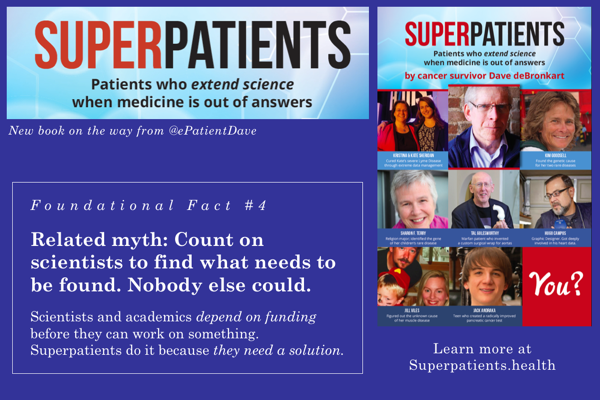Continuing the series started Friday – fourteen foundation truths to set the stage for the upcoming book Superpatients: Patients who extend science when medicine’s out of answers.

Yesterday’s entry was principle #3: It’s a myth that doctors can be counted on to know what’s dependable, and nobody else can. Today’s is a close relative:
Related myth:
“Count on scientists to find
what needs to be found.
Nobody else could.”
Think clearly, people. I know some people will be alarmed or offended by this. I didn’t say “Science is bunk” or “Scientists don’t care about you.” Some readers will think that, but it’s not what I said. And when you’re a superpatient at the fringes of medical knowledge, it’s essential to think clearly.
Here’s an anecdote: One of my great disillusionments as I started learning about science ten years ago was the discovery that scientists do not sit around deciding what would be great to investigate – they have to go find funding for it, so what they get to work on depends on what various funders are willing to pay for. (Example: for years we struggled to get researchers interested in patient engagement and patient-centered thinking. Then along came PCORI – the Patient Centered Outcomes Research Institute – with its $6 billion of funding, and suddenly those same scientists were fascinated with the subject.)
Think about that. For most patients this is no problem – most medical needs are mainstream. But for people at the fringes of medical knowledge it can be an immense challenge.
Another anecdote: on Halloween 2012 I gave a speech at a medical school that was so scary-good :-) that the host literally wanted to put me on the faculty there. But was there funding? No; he said “Around here we eat what we kill.” He meant that everyone there had to go hunt down their own funding. There was nobody sitting on a single big pot of cash and deciding what important topics needed support.
If you’re a patient at the fringes, it’s entirely reasonable to consider going beyond, if you want. There may be scientists who’d love to work on your frontier challenge if they had the money. If they don’t, the next step is up to you.
Again, the superpatient perspective:
Here’s what superpatient Sharon Terry said about it in her TED Talk:
Part Four of Superpatients is titled “So you want to be Super too?” It talks about the obstacles you’ll face; it’s not easy. But it’s not unreasonable for you to have those thoughts.
Next in the series: #5: Some doctors were trained wrong about what information’s dependable.


Great insight on this Dave (and on the series itself). Fundamental to all this is “They” don’t know what they don’t know. Where “They” refers to the researchers, funders and patients. So instead of everyone making (or receiving) decisions in a silo, all parties should be brought together to provide an enhanced knowledge base.
Something may seem on the fringe to one party, but not to another, but without communicating together, something may remain in isolation that can likely benefit both what was perceived to be the fringe as well as a wider population. Just a thought for discussion.
Thanks for the blogs Dave
Great to hear from you, Howard – thanks a million for moving this over here from LinkedIn!